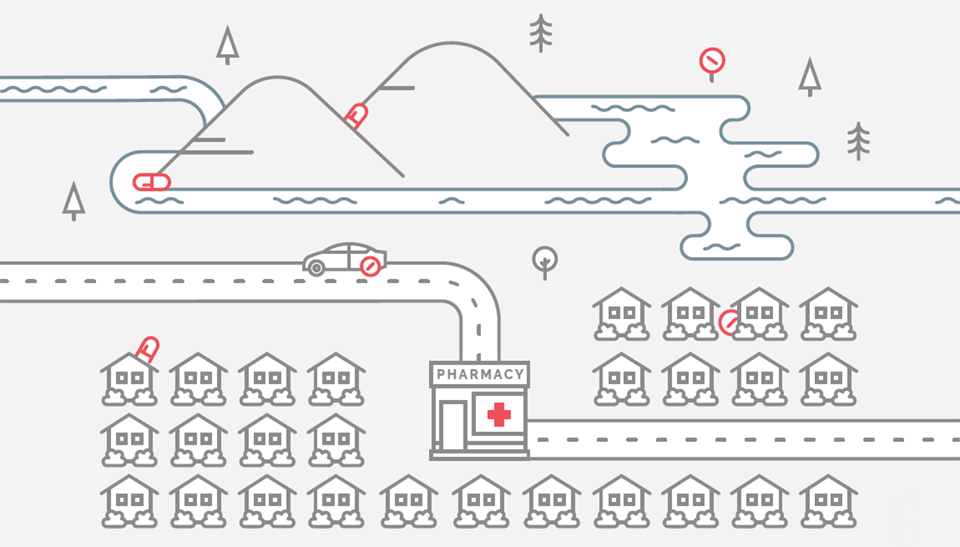The numbers are stunning: 76 billion prescription opioid pills flooded the U.S. from 2006-2012. That's the equivalent of about 230 oxycodone and hydrocodone pills for every person in the country.
Six companies distributed 75% of the pills, and four companies manufactured more than 90% of all the pills. Since 1999, more than 230,000 people have died from prescription opioid overdoses.
"This data confirms that the pharmaceutical industry created a tsunami of opiates that drove addiction and death rates up," observed Dr. Thomas Frieden, former head of the Centers for Disease Control and Prevention.
These facts behind the national opioid epidemic would still be a secret if not for WVU Law professors Patrick McGinley and Suzanne Weise.
Their ultimate victory, in what The Washington Post called an “epic legal battle,” forced the public disclosure of nationwide opioid distribution data exposing facts underlying the largest public health crisis of our time — before COVID-19.

Professors Suzanne Weise and Patrick McGinley
The West Virginia Pill Mill Case
McGinley’s and Weise’s legal battles to expose hidden truths behind the opioid epidemic began when they were asked to represent the Charleston Gazette-Mail in spring 2016. WVU College of Law graduate Timothy Conaway ’75 joined them as counsel for the newspaper.
The newspaper’s management asked the pair to create a strategy that would force the unsealing of filed court records in the first opioid “pill mill cases” brought in 2012 by West Virginia’s attorney general against Fortune 500 prescription opioid distributors that alleged the defendants were complicit in fueling West Virginia’s growing opioid epidemic.
Boone County Judge William S. Thompson granted the newspaper’s request to intervene and, over the objections of the drug company defendants, ordered all of the previously sealed opioid records disclosed to the public.
Investigative reporter Eric Eyre of the Charleston Gazette-Mail used the DEA opioid data and similar secret information he obtained, with the assistance of McGinley and Weise, from the state attorney general. Eyre’s articles earned him the 2017 Pulitzer Prize for Investigative Journalism. Eyre’s articles revealed that 780 million addictive pills had found their way into West Virginia between 2007 and 2012; West Virginia’s population is just over 1.8 million.
The drug company defendants agreed to settlements of the cases within weeks after Eyre’s articles appeared.
Following these first-in-the-nation settlements, cities, counties, and states across the U.S. filed similar cases against prescription opioid manufacturers, distributors and retail pharmacies seeking compensation to cover government costs of dealing with the opioid crisis.
The National Prescription Opioid Litigation
The next chapter of the war on addictive pain-killers — the “epic legal battle” — began in spring of 2018. The professors’ success in forcing the disclosure of previously sealed court records in the West Virginia pill mill cases led to HD Media’s (owner of the Charleston Gazette-Mail) request that McGinley and Weise devise a litigation strategy to obtain the DEA opioid national distribution database — information documenting the flow of prescription opioids that flooded the other 49 states.
The national DEA data sought by HD Media had been released to government plaintiffs’ lawyers for use in the, by then, 2,000-plus opioid multidistrict litigation (MDL) cases consolidated in and overseen by the U.S. Court for the Northern District of Ohio. Public release of the data was prohibited by a strict court protective order agreed to by the DEA and drug company defendants as well as the government plaintiffs.
McGinley and Weise, joined by Washington Post counsel Karen Lefton, sought to intervene in the MDL on behalf of the newspapers. When the district judge denied their request for public disclosure of the DEA data, HD Media and the Post appealed the adverse decision to the U.S. Court of Appeals for the Sixth Circuit in Cincinnati, Ohio.
An excerpt from HD Media’s brief for the Sixth Circuit written by McGinley and Weise reveals their motivation and passion:
Drug distributors and manufacturers have spent more than a decade trying to conceal the tsunami of prescription opioids flowing into American communities. Literarily hundreds of thousands of citizens have died from prescription opioid overdoses. Millions more have fallen prey, not to dope peddled by drug gangs and street pushers, but to prescription opioids channeled from manufacturer to distributor to neighborhood pharmacies.
Access to the West Virginia ARCOS data cracked open the veil of secrecy, revealing that 780,000,000 pills took this route into the Mountain State (population 1,815,000), which ranks number one in the United States in opioid overdose deaths.
The prescription opioid epidemic has similarly blighted communities across the nation, while corporate profits soared to billions. During the same time period of 2006-2014, the DEA failed to effectively use the ARCOS data to take needed enforcement action. Now, the agency, drug distributors, and pharmacies argue that Americans in other states are not entitled to see the same type of historic data that educated West Virginians about the flow of addictive pills into their state. Quoting Justice Louis Brandeis, a giant of our country’s jurisprudence, this Court observed, “sunlight is the best disinfectant.”
HDM respectfully urges this Court to reject arguments for continued secrecy and open the door to information that this country needs to promote understanding and healing of the deep and lasting wounds inflicted by the opioid epidemic.
In May 2019, McGinley argued the case before a panel of Sixth Circuit judges. Opposing were Ashley W. Hardin of Williams & Connolly, LLP, Washington, D.C., counsel for the distributor, manufacturer, and chain pharmacy defendants, and Sarah Carroll of the U.S. Department of Justice, representing the DEA.
On June 20, 2019, the appeals court issued an opinion reversing and remanding the case to the lower court. In its ruling, the court held that “the district court abused its discretion in finding ‘good cause’ not to permit disclosure of the [DEA] data pursuant to state public records requests.”
The court emphasized that the release of earlier DEA data in the previous case in West Virginia involving McGinley and Weise “resulted in no demonstrated commercial harm to Defendants and no demonstrated interference with law enforcement interests; but this reporting did result … in a Congressional Committee report, and a broader public understanding of the scope, context, and causes of the opioid epidemic.”
The case was remanded to the district court “to permit [it] to consider entering a new protective order consistent with the proper legal standards … the … court may entertain arguments by the DEA as to why particular pieces of [DEA] data that relate to specific ongoing investigations should not be disclosed; however, the district c ourt shall not enter a blanket, wholesale ban on disclosure …”
On July 15, 2019, the MDL District Court concluded “there is clearly no basis to shield from public view [DEA] data dated on or before December 31, 2012” and ordered that the information be released to the public.
In October 2019, the district court ordered virtually all sealed records and additional DEA data for 2013-2014 be disclosed to the public.
The work of McGinley and Weise for the Charleston Gazette-Mail, HD Media, and Lefton, for the Washington Post, resulted in total victory in the newspapers’ quest for government and judicial transparency.
“This was an extraordinary victory for people across the country whose communities were inundated by huge quantities of addictive prescription opioids and for an independent free press committed to digging deep to uncover the truth,” Weise said. “Poor, rich and middle class, old and young were all the targets of opioid manufacturers, distributors and retail pharmacies whose profits soared while hundreds of thousands died from overdoses, and the DEA failed to use the data to suppress the epidemic.”
Update: Purdue Pharma Falls
In late October 2020, the U.S. Department of Justice announced a settlement with Purdue Pharma, which had manufactured OxyContin, it's version of oxycodone, for decades. According to the national opioid distribution data, Purdue was directly responsible for about three percent of the market.
“ The Justice Department announced a historic $8.3 billion settlement Wednesday with OxyContin-maker Purdue Pharma, capping a long-running federal investigation into the company that, for critics, became a leading symbol of corporations profiting from America’s deadly addiction to opioid painkillers. ” — The Washington Post, October 21, 2020.
McGinley and Weise (and the CDC) allege that OxyContin helped spur the opioid epidemic starting in the 1990s. After the DOJ announcement, they questioned whether the settlement, seen by many as largely symbolic, will actually trickle down to communities across the country that were ravaged by the opioid epidemic.
“State and local governments estimate present and future costs of treating opioid addiction will total $ 2.15 trillion,” McGinley said. “However, the Sackler family, billionaire owners of Purdue Pharma, continue to deny criminal and civil culpability. This was literally a legal drug cartel where billions of dollars were made selling these addictive drugs without any serious law enforcement actions.”
According to Wiese, it isn’t clear if any of the settlement will reach states, counties and cities that funded addiction treatment programs.
“Twenty-five state attorneys general have objected to the settlement arguing it is too lenient and fails to adequately hold the company’s managers and owners responsible for the harm they caused. It remains to be seen whether the settlement is fair, just, and will actually assist the thousands of communities across the country struggling to deal with the ongoing human devastation caused by prescription opioid addiction,” Weise said.

James Jolly, 11/4/20




